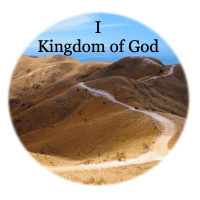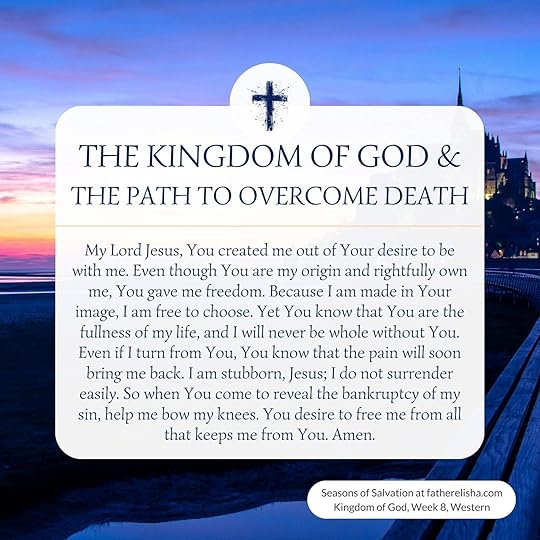Kingdom of God 8 (Western): The Kingdom of God and the Path to Overcome Death

 The Spiritual Mysteries of the Divine Calendar: The Kingdom of God and the Path to Overcome Death ~ October 26 – November 1, 2025 ~
The Spiritual Mysteries of the Divine Calendar: The Kingdom of God and the Path to Overcome Death ~ October 26 – November 1, 2025 ~ When an enemy knows its opponent is about to enter its most valuable territory, it sends its most intimidating weapon to scare the invader away and plant second thoughts about whether victory is possible. The enemy of our souls does the same. When he senses the Holy Spirit surrounding one of his darkened strongholds and preparing to enter, he unleashes his most cruel lies to make us doubt that God can truely answer our prayers or that the promises of the Kingdom of God can really change something in our lives or circumstances.
In this eighth week of the Season of the Kingdom of God in the Divine Calendar, we will look at how to overcome the fiercest power in the Kingdom of Darkness—the power of death.
Jesus at the GateWe see this pattern in this week’s Sunday Gospel, and what’s most touching is that Jesus responds to our wavering with compassion. As we read in the book of Hebrews: “For we do not have a High Priest who cannot sympathize with our weaknesses, but was in all points tempted as we are, yet without sin” (Heb. 4:15).
We see Jesus near the gate of the city of Nain. As the Son of God approaches with His testimony about the Kingdom of Heaven, the enemy of humanity brings out a coffin containing the deceased son of a despairing widow who has lost all hope. It is at the gate—the very entrance that will change the future of this city—that the coffin is paraded.
But the Sunday Gospel tells us not to lose hope or despair. When we are so close to entering our promise, the enemy will display our inadequacies before our eyes to make us draw back. Yet Jesus has compassion on us and says, “Do not weep […] Young man, I say to you, arise.” He exposes the enemy, reveals his deception, and enters the previously seized city within our soul.
Our Progress through the Divine Calendar
The Season of the Kingdom of God unfolds in stages, and this the distance we have journeyed so far:
The Kingdom of God Declared in Power
Week 1: Building the Kingdom of God
Week 2: Recognizing Our Call to Repentance
The Absence of the Kingdom of God
Week 3: Zacchaeus and His Desire to See Jesus
Week 4: The Inner Vacuum and Mary’s Alabaster Flask
The Gradual Descent When We Lose the Vision of the Kingdom of God (4 weeks)
Week 5: Healing the Paralytic and Our Inner Paralysis
Week 6: Jesus in the Boat and Fruitless Toil
Week 7 (Last Week): Repentance and Renewal — Moving from Despair to Hope
Toward the Fullness of Christ
God prepares us to work with Him to expand His Kingdom—first within us, and then through us to the world. To reach this goal, the Holy Spirit highlights a certain obstacle in our fallen human nature that hinders us from taking the next step He has ordained for us individually. The key to discovering this activity of the Spirit is daily repentance, which can take the form of reviewing our day with the Holy Spirit each evening.
What the Holy Spirit underlines during these first ten weeks of the Divine Calendar (the Season of the Kingdom of God) usually points to a specific deep root in our fallen nature that blocks our progress. During this liturgical year, God will focus on crucifying this root and renewing this part of our soul through resurrection into Christlikeness—the new man.
The Previous Three Levels of the Absence of the Kingdom of God
We have arrived at the last of the four weeks revealing the sad condition of the soul left in the absence of Christ’s lordship. “For indeed, the kingdom of God is within you” (Luke 17:21b).
Our lives in following Jesus are a continual process of reaching “the unity of the faith and of the knowledge of the Son of God, to a perfect man, to the measure of the stature of the fullness of Christ” (Eph. 4:13), because “both He who sanctifies and those who are being sanctified are all of one” (Heb. 2:22). We are “predestined to be conformed to the image of His Son, that He might be the firstborn among many brethren” (Rom. 8:29).
As we follow Jesus through the Seasons of Salvation, the Holy Spirit helps us to be “transformed into the same image from glory to glory” (2 Cor. 3:18). So far, we have discovered three levels of symptoms when our life is absent from the Kingdom of God.
First, it manifests as a sense of inner paralysis.
If this inner paralysis persists, the second level appears: all our work for God becomes exhausting toil that bears no fruit—unless God has hidden us for a future purpose.
If the light of God cannot reach this part of our soul, the darkness may thicken and turn into inner blindness and muteness, blocking our ability to testify about God’s work and leading us into the dreaded despair. We lose hope that God can change this part of us.
This week, we will uncover the darkest symptom of isolation from God’s Kingdom, after despair has taken full reign. Sobering, yes—but the light of the Kingdom of God shines all the brighter.

Photo by Nazrin Babashova on Unsplash
Sunday Gospel for the Kingdom of God and the Path to Overcome Death: Luke 7:11–17 (NKJV)Now it happened, the day after, that He went into a city called Nain; and many of His disciples went with Him, and a large crowd. 12 And when He came near the gate of the city, behold, a dead man was being carried out, the only son of his mother; and she was a widow. And a large crowd from the city was with her.
13 When the Lord saw her, He had compassion on her and said to her, “Do not weep.” 14 Then He came and touched the open coffin, and those who carried him stood still. And He said, “Young man, I say to you, arise.” 15 So he who was dead sat up and began to speak. And He presented him to his mother.
16 Then fear came upon all, and they glorified God, saying, “A great prophet has risen up among us”; and, “God has visited His people.” 17 And this report about Him went throughout all Judea and all the surrounding region.
Jesus Comes Close to Home
In Luke 7:11, we read: “Now it happened, the day after, that He went into a city called Nain; and many of His disciples went with Him, and a large crowd.”
Jesus comes toward Nain with crowds following Him. These people are neither paralyzed, nor suffering fruitlessness, nor trapped in despair that mutes their testimony about Him. They are drawn to Him by His teachings, His miracles, or the growing rumor of Him being the Messiah.
The city name Nain means “a home,” “habitation,” and “a pleasant place.” When Jesus draws near one of our inner Jerichos—confronting the self-elected government of His majesty, King Ego—things may occur that can confuse us if we do not realize what is happening.
Coming to the Surface
We read in Luke 7:12: “And when He came near the gate of the city, behold, a dead man was being carried out, the only son of his mother; and she was a widow. And a large crowd from the city was with her.”
When Jesus draws near the gate of the city—when He comes close to our weakness in His determined yet humble way—a despairing widow, who has lost all hope for her lineage to continue, comes to meet Him. She has no husband, and her only son has died, and so she despairs because her family line will end with her son. The first thing Jesus encounters from the city of Nain is this coffin of death.
When we experience a sudden manifestation of our fallen human nature—something that usually remains hidden—it is a sign that Jesus is drawing near the gate of our sinful nature. Such a confrontation with “the light of the world” (John 8:12) pushes our fallen nature to the surface, and we may suddenly notice or fall into sinful patterns in unusual ways. We might burst into anger, feel hopeless, or surrender to circumstances.
When the city of Nain carries out the coffin of death—when our fallen human nature rises to the surface—we are not to be afraid. Instead, we are to recognize that Jesus is near, ready to answer our prayers of repentance and proclaim the truths of God’s Word and His Kingdom over our lives.
The Fourth Symptom of the Absence of the Kingdom of God: Death
The fourth and last symptom of the soul left outside God’s Kingdom is this coffin—death. If despair grows and establishes deep roots, death will eventually reign in this part of our lives. This might sound strange since God has adopted us as His children through faith in Christ, but death might still reign in parts of our soul after being born again into the Kingdom of God.
The Apostle Paul writes: “Therefore, brethren, we are debtors—not to the flesh, to live according to the flesh. For if you live according to the flesh you will die; but if by the Spirit you put to death the deeds of the body, you will live” (Rom. 8:12–13). He also writes: “I say then: Walk in the Spirit, and you shall not fulfill the lust of the flesh. For the flesh lusts against the Spirit, and the Spirit against the flesh; and these are contrary to one another, so that you do not do the things that you wish” (Gal. 5: 16–17).
But the most accurate description we find in Romans:
“Now if I do what I will not to do, it is no longer I who do it, but sin that dwells in me. I find then a law, that evil is present with me, the one who wills to do good. For I delight in the law of God according to the inward man. But I see another law in my members, warring against the law of my mind, and bringing me into captivity to the law of sin which is in my members. O wretched man that I am! Who will deliver me from this body of death? I thank God—through Jesus Christ our Lord!” (Rom. 7:20–25).

Photo by Jack B on Unsplash
The Compassionate JesusWe read in Luke 7:13–14: “When the Lord saw her, He had compassion on her and said to her, ‘Do not weep.’ Then He came and touched the open coffin, and those who carried him stood still. And He said, ‘Young man, I say to you, arise.’”
Oh, the compassionate Jesus. When His divine presence invades the territory of our fallen human nature, forcing a certain manifestation of sin to the surface, He doesn’t do so to humiliate or condemn us.
This is the most magnificent side of our Beloved Savior. When we sin, Jesus does not condemn us—He covers us. The Evangelist John writes: “When Jesus had raised Himself up and saw no one but the woman, He said to her, ‘Woman, where are those accusers of yours? Has no one condemned you?’ She said, ‘No one, Lord.’ And Jesus said to her, ‘Neither do I condemn you; go and sin no more’” (John 8:10–11).
Touching the Coffin
This is the nature of Jesus in His first coming: “And if anyone hears My words and does not believe, I do not judge him; for I did not come to judge the world but to save the world” (John 12:47). Jesus feels compassion for the widow and says to her, “Do not weep.” This is the Jesus that surrounds the city of our fallen human nature. He has compassion on us, and when we confess our sins, He immediately comforts us and dries our tears. Jesus touches the coffin—the area of our soul—and says: “Young man, I say to you, arise.”
“Death is swallowed up in victory” (1 Cor. 15:54), and we may receive a foretaste of this victory even now if we perceive and respond to these surfacing sins. However, the final resurrection and the seal of the work of redemption—on a larger scale than we realize—come later in the Divine Calendar, perhaps even after several years of journeying through the Seasons of Salvation.
There is no hopeless condition nor siege of death within our soul that Jesus cannot redeem. We might have lost hope for change—even others might have given up on us—but Jesus never will.
An Everlasting Name in the Kingdom of God
In Luke 7:15, we see Jesus return the resurrected son to his mother. Jesus saved the widow’s inheritance—her lineage would go on. The prophet Isaiah speaks of the significance of our eternal inheritance:
“Thus says the Lord: ‘Keep justice, and do righteousness, for My salvation is about to come’ […] Do not let the son of the foreigner who has joined himself to the Lord speak, saying, ‘The Lord has utterly separated me from His people’; nor let the eunuch say, ‘Here I am, a dry tree.’ For thus says the Lord: ‘To the eunuchs who keep My Sabbaths, and choose what pleases Me, and hold fast My covenant, even to them I will give in My house and within My walls a place and a name better than that of sons and daughters; I will give them an everlasting name that shall not be cut off’” (Isa. 56:1–5).
The final verses of Luke 7:16–17 reveal the amazement of the people of Nain and how their testimony spread from Nain to Judea and beyond. As we have seen in the previous weeks, once a part of our soul receives the power of resurrection and comes under the Lordship of Jesus, the effect becomes visible to everyone around us. We witness how an inner extension of the Kingdom of God manifests outwardly. To our compassionate Jesus be all the glory.
When Jesus Returns
We see Jesus as the compassionate Savior, immediately covering our sins, in His first coming. But in His Second Coming, we will witness a different revelation of Jesus Christ. He remains the same as He was at His first coming, yet the damage of sin and death will have reached its limit. Jesus will soon return as a roaring Lion. He will ride a warhorse, fiercely bringing an end to all evil on the earth as a jealous Bridegroom. For those who still clench their fists at His face, His coming will be terrifying.
“The Lord shall go forth like a mighty man; He shall stir up His zeal like a man of war. He shall cry out, yes, shout aloud; He shall prevail against His enemies. ‘I have held My peace a long time, I have been still and restrained Myself. Now I will cry …’” (Isa. 42:13–14a).
Concluding the Kingdom of God and the Path to Overcome DeathThank you for taking the time to read and share this moment with me. The honor is truly mine. I pray the Lord will draw near and stir our spirits as we move toward the final two weeks of the first Season of Salvation in the Divine Calendar.
Please leave a comment below—we’d love to hear your thoughts. If you found this post helpful, feel free to share it using the buttons at the top of the page.
Join the Journey Through the Seasons of SalvationJoin us on this weekly journey through the Seasons of Salvation as we walk in the footsteps of Jesus Christ through the key seasons of His life.
Sign up to receive this year’s Divine Calendar, which introduces the Seasons of Salvation and guides you through the journey ahead. As a welcome gift, you’ll also receive my young adult novel, The Legend of the Divine Calendar, delivered straight to your inbox.
Visit the Seasons of Salvation blog for insights into the coming week, posted every Saturday. We’d be honored to have you join us.
Save Your Prayer Card on Your Smartphone

Photo by Frederic Paulussen on Unsplash
The post Kingdom of God 8 (Western): The Kingdom of God and the Path to Overcome Death first appeared on Father Elisha: Let me take you on an intriguing journey..



